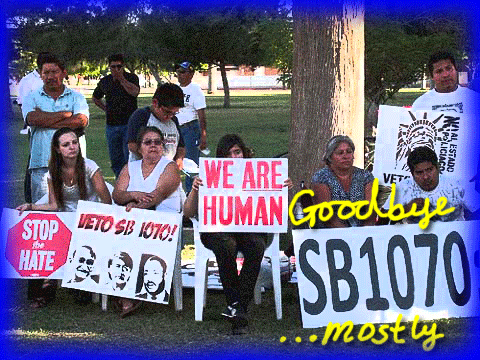SCOTUS STRIKES DOWN MOST OF ARIZONA IMMIGRATION LAW
The Supreme Court decided Monday in a 5-3 decision that Arizona immigration law does not supersede federal immigration law.
SF Gate’s Greg Stohr has the story. Here’s how it opens:
The U.S. Supreme Court scaled back Arizona’s first-of-its-kind crackdown on illegal immigrants, striking down three provisions in a decision that asserts the federal government’s exclusive role to set immigration policy.
The ruling leaves intact, for now, the law’s centerpiece requirement that Arizona police check the immigration status of people they suspect are in the country illegally. Even so, the 5-3 decision took some of the force from that provision by invalidating parts of the law that would have given the state’s police more power to arrest people for immigration violations.
The ruling gives President Barack Obama’s administration most of what it sought when it sued to block the Arizona law. Supporters of the law said the federal government isn’t doing enough to crack down on an estimated 11.5 million people in the country illegally.
“Arizona may have understandable frustrations with the problems caused by illegal immigration while that process continues, but the state may not pursue policies that undermine federal law,” Justice Anthony Kennedy wrote for the majority.
It should be noted, however, that the reason that the “show me your papers” part of the bill was left alone was because it has not yet been implemented.
The New Yorker Blog’s Alex Koppelman explains in more detail. Here’s a clip:
You can, if you like, interpret that as a defeat for President Obama and for liberal immigration activists. Certainly that’s what Fox News did, and it’s what Arizona Governor Jan Brewer did, when she called the decision “a victory for the rule of law” and “a victory for the 10th Amendment and all Americans who believe in the inherent right and responsibility of states to defend their citizens.” Or you can read the parts of the opinion in which Justice Anthony Kennedy, who wrote it, makes clear that the part of the law he let stand remains because the state hasn’t yet implemented it, or shown how it will implement it, and that it could very well fall later. (And you could take a look around Arizona and see that people like Sheriff Joe Arpaio may very well, in the way they enforce the bit that remains, make it easy for the Court to strike the whole thing down at some point soon.)
SUPREME COURT UPHOLDS 2010 CITIZENS UNITED DECISION
Another important SCOTUS decision made Monday upheld the previous Citizen’s United ruling that allows corporate entities to donate unlimited funds to campaigns.
The Atlantic’s Alex Roarty has the story. Here’s a clip:
The Supreme Court’s rejection of a long-shot legal challenge to let states bar corporate and union political contributions in their own elections underscores the legal quandary in which many left-of-center campaign finance reformers find themselves.
The court, in a 5-to-4 vote split along ideological lines, refused on Monday to strike down a Montana ban on corporate political spending. The decision effectively upholds its landmark 2010 decision Citizens United v. Federal Election Commission, which held that corporations and unions were entitled to the same free speech protections as citizens, or at least allow state law to supersede it.
Because the Supreme Court decided Citizens United only two years ago and its conservative majority remains intact, few legal experts expected it to rule in favor of the challenge.
The current case, American Tradition Partnership v. Bullock, stemmed from a century-old Montana law that prohibits corporations from spending money on political campaigns. The effort, joined by more than 20 states, stipulated states should be allowed to carve out their own rules to regulate political fundraising and spending, an argument backed by the Montana Supreme Court when it ruled in favor of the state law last year.
DOJ TO FUND NEW COP JOBS FOR VETS
The Department of Justice announced the awarding of grants to fund approximately 800 law enforcement positions to be filled by military veterans.
You can read the press release on the DOJ website. Here are some clips:
The U.S. Department of Justice Office of Community Oriented Policing Services (COPS) today announced funding awards to over 220 cities and counties, aimed at creating or saving approximately 800 law enforcement positions. The grants will fund over 600 new law enforcement positions and save an additional 200 positions recently lost or in jeopardy of being cut due to local budget cuts. All new law enforcement positions funded in the COPS 2012 Hiring Program must be filled by recent military veterans who have served at least 180 days since Sept. 11, 2001.
[SNIP]“Today, we step up our support for recent veterans by offering them the chance to pursue meaningful careers in law enforcement,” said Attorney General Eric Holder. “At a time of budget shortfalls, these grants will provide opportunities for much-needed, highly-trained professionals – with a proven commitment to service – to continue their careers in communities all across the country.”
By the way, Our Weekly reports that LA received the largest amount of grant money from the DOJ program.
Photo courtesy RI4A via Flickr under Creative Commons license.

